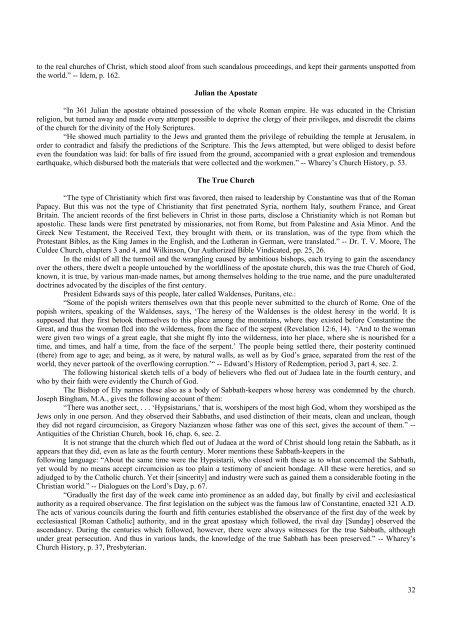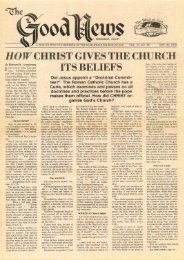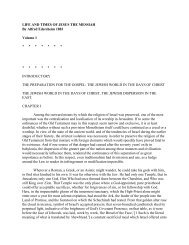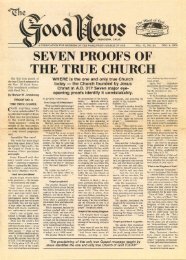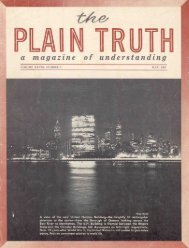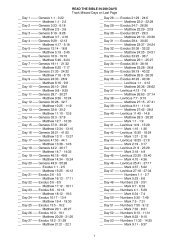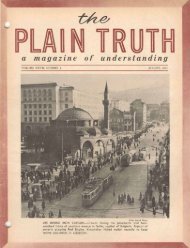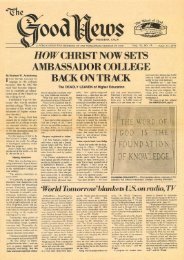History of the True Religion Traced from 33AD to Date - Lcgmn.com
History of the True Religion Traced from 33AD to Date - Lcgmn.com
History of the True Religion Traced from 33AD to Date - Lcgmn.com
Create successful ePaper yourself
Turn your PDF publications into a flip-book with our unique Google optimized e-Paper software.
<strong>to</strong> <strong>the</strong> real churches <strong>of</strong> Christ, which s<strong>to</strong>od alo<strong>of</strong> <strong>from</strong> such scandalous proceedings, and kept <strong>the</strong>ir garments unspotted <strong>from</strong><br />
<strong>the</strong> world.” -- Idem, p. 162.<br />
Julian <strong>the</strong> Apostate<br />
“In 361 Julian <strong>the</strong> apostate obtained possession <strong>of</strong> <strong>the</strong> whole Roman empire. He was educated in <strong>the</strong> Christian<br />
religion, but turned away and made every attempt possible <strong>to</strong> deprive <strong>the</strong> clergy <strong>of</strong> <strong>the</strong>ir privileges, and discredit <strong>the</strong> claims<br />
<strong>of</strong> <strong>the</strong> church for <strong>the</strong> divinity <strong>of</strong> <strong>the</strong> Holy Scriptures.<br />
“He showed much partiality <strong>to</strong> <strong>the</strong> Jews and granted <strong>the</strong>m <strong>the</strong> privilege <strong>of</strong> rebuilding <strong>the</strong> temple at Jerusalem, in<br />
order <strong>to</strong> contradict and falsify <strong>the</strong> predictions <strong>of</strong> <strong>the</strong> Scripture. This <strong>the</strong> Jews attempted, but were obliged <strong>to</strong> desist before<br />
even <strong>the</strong> foundation was laid: for balls <strong>of</strong> fire issued <strong>from</strong> <strong>the</strong> ground, ac<strong>com</strong>panied with a great explosion and tremendous<br />
earthquake, which disbursed both <strong>the</strong> materials that were collected and <strong>the</strong> workmen.” -- Wharey’s Church <strong>His<strong>to</strong>ry</strong>, p. 53.<br />
The <strong>True</strong> Church<br />
“The type <strong>of</strong> Christianity which first was favored, <strong>the</strong>n raised <strong>to</strong> leadership by Constantine was that <strong>of</strong> <strong>the</strong> Roman<br />
Papacy. But this was not <strong>the</strong> type <strong>of</strong> Christianity that first penetrated Syria, nor<strong>the</strong>rn Italy, sou<strong>the</strong>rn France, and Great<br />
Britain. The ancient records <strong>of</strong> <strong>the</strong> first believers in Christ in those parts, disclose a Christianity which is not Roman but<br />
apos<strong>to</strong>lic. These lands were first penetrated by missionaries, not <strong>from</strong> Rome, but <strong>from</strong> Palestine and Asia Minor. And <strong>the</strong><br />
Greek New Testament, <strong>the</strong> Received Text, <strong>the</strong>y brought with <strong>the</strong>m, or its translation, was <strong>of</strong> <strong>the</strong> type <strong>from</strong> which <strong>the</strong><br />
Protestant Bibles, as <strong>the</strong> King James in <strong>the</strong> English, and <strong>the</strong> Lu<strong>the</strong>ran in German, were translated.” -- Dr. T. V. Moore, The<br />
Culdee Church, chapters 3 and 4, and Wilkinson, Our Authorized Bible Vindicated, pp. 25, 26.<br />
In <strong>the</strong> midst <strong>of</strong> all <strong>the</strong> turmoil and <strong>the</strong> wrangling caused by ambitious bishops, each trying <strong>to</strong> gain <strong>the</strong> ascendancy<br />
over <strong>the</strong> o<strong>the</strong>rs, <strong>the</strong>re dwelt a people un<strong>to</strong>uched by <strong>the</strong> worldliness <strong>of</strong> <strong>the</strong> apostate church, this was <strong>the</strong> true Church <strong>of</strong> God,<br />
known, it is true, by various man-made names, but among <strong>the</strong>mselves holding <strong>to</strong> <strong>the</strong> true name, and <strong>the</strong> pure unadulterated<br />
doctrines advocated by <strong>the</strong> disciples <strong>of</strong> <strong>the</strong> first century.<br />
President Edwards says <strong>of</strong> this people, later called Waldenses, Puritans, etc.:<br />
“Some <strong>of</strong> <strong>the</strong> popish writers <strong>the</strong>mselves own that this people never submitted <strong>to</strong> <strong>the</strong> church <strong>of</strong> Rome. One <strong>of</strong> <strong>the</strong><br />
popish writers, speaking <strong>of</strong> <strong>the</strong> Waldenses, says, ‘The heresy <strong>of</strong> <strong>the</strong> Waldenses is <strong>the</strong> oldest heresy in <strong>the</strong> world. It is<br />
supposed that <strong>the</strong>y first be<strong>to</strong>ok <strong>the</strong>mselves <strong>to</strong> this place among <strong>the</strong> mountains, where <strong>the</strong>y existed before Constantine <strong>the</strong><br />
Great, and thus <strong>the</strong> woman fled in<strong>to</strong> <strong>the</strong> wilderness, <strong>from</strong> <strong>the</strong> face <strong>of</strong> <strong>the</strong> serpent (Revelation 12:6, 14). ‘And <strong>to</strong> <strong>the</strong> woman<br />
were given two wings <strong>of</strong> a great eagle, that she might fly in<strong>to</strong> <strong>the</strong> wilderness, in<strong>to</strong> her place, where she is nourished for a<br />
time, and times, and half a time, <strong>from</strong> <strong>the</strong> face <strong>of</strong> <strong>the</strong> serpent.’ The people being settled <strong>the</strong>re, <strong>the</strong>ir posterity continued<br />
(<strong>the</strong>re) <strong>from</strong> age <strong>to</strong> age; and being, as it were, by natural walls, as well as by God’s grace, separated <strong>from</strong> <strong>the</strong> rest <strong>of</strong> <strong>the</strong><br />
world, <strong>the</strong>y never par<strong>to</strong>ok <strong>of</strong> <strong>the</strong> overflowing corruption.’“ -- Edward’s <strong>His<strong>to</strong>ry</strong> <strong>of</strong> Redemption, period 3, part 4, sec. 2.<br />
The following his<strong>to</strong>rical sketch tells <strong>of</strong> a body <strong>of</strong> believers who fled out <strong>of</strong> Judaea late in <strong>the</strong> fourth century, and<br />
who by <strong>the</strong>ir faith were evidently <strong>the</strong> Church <strong>of</strong> God.<br />
The Bishop <strong>of</strong> Ely names <strong>the</strong>se also as a body <strong>of</strong> Sabbath-keepers whose heresy was condemned by <strong>the</strong> church.<br />
Joseph Bingham, M.A., gives <strong>the</strong> following account <strong>of</strong> <strong>the</strong>m:<br />
“There was ano<strong>the</strong>r sect, . . . ‘Hypsistarians,’ that is, worshipers <strong>of</strong> <strong>the</strong> most high God, whom <strong>the</strong>y worshiped as <strong>the</strong><br />
Jews only in one person. And <strong>the</strong>y observed <strong>the</strong>ir Sabbaths, and used distinction <strong>of</strong> <strong>the</strong>ir meats, clean and unclean, though<br />
<strong>the</strong>y did not regard circumcision, as Gregory Nazianzen whose fa<strong>the</strong>r was one <strong>of</strong> this sect, gives <strong>the</strong> account <strong>of</strong> <strong>the</strong>m.” --<br />
Antiquities <strong>of</strong> <strong>the</strong> Christian Church, book 16, chap. 6, sec. 2.<br />
It is not strange that <strong>the</strong> church which fled out <strong>of</strong> Judaea at <strong>the</strong> word <strong>of</strong> Christ should long retain <strong>the</strong> Sabbath, as it<br />
appears that <strong>the</strong>y did, even as late as <strong>the</strong> fourth century. Morer mentions <strong>the</strong>se Sabbath-keepers in <strong>the</strong><br />
following language: “About <strong>the</strong> same time were <strong>the</strong> Hypsistarii, who closed with <strong>the</strong>se as <strong>to</strong> what concerned <strong>the</strong> Sabbath,<br />
yet would by no means accept circumcision as <strong>to</strong>o plain a testimony <strong>of</strong> ancient bondage. All <strong>the</strong>se were heretics, and so<br />
adjudged <strong>to</strong> by <strong>the</strong> Catholic church. Yet <strong>the</strong>ir [sincerity] and industry were such as gained <strong>the</strong>m a considerable footing in <strong>the</strong><br />
Christian world.” -- Dialogues on <strong>the</strong> Lord’s Day, p. 67.<br />
“Gradually <strong>the</strong> first day <strong>of</strong> <strong>the</strong> week came in<strong>to</strong> prominence as an added day, but finally by civil and ecclesiastical<br />
authority as a required observance. The first legislation on <strong>the</strong> subject was <strong>the</strong> famous law <strong>of</strong> Constantine, enacted 321 A.D.<br />
The acts <strong>of</strong> various councils during <strong>the</strong> fourth and fifth centuries established <strong>the</strong> observance <strong>of</strong> <strong>the</strong> first day <strong>of</strong> <strong>the</strong> week by<br />
ecclesiastical [Roman Catholic] authority, and in <strong>the</strong> great apostasy which followed, <strong>the</strong> rival day [Sunday] observed <strong>the</strong><br />
ascendancy. During <strong>the</strong> centuries which followed, however, <strong>the</strong>re were always witnesses for <strong>the</strong> true Sabbath, although<br />
under great persecution. And thus in various lands, <strong>the</strong> knowledge <strong>of</strong> <strong>the</strong> true Sabbath has been preserved.” -- Wharey’s<br />
Church <strong>His<strong>to</strong>ry</strong>, p. 37, Presbyterian.<br />
32


